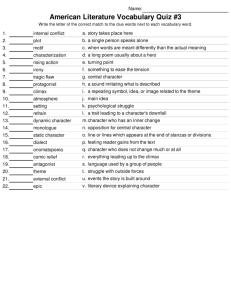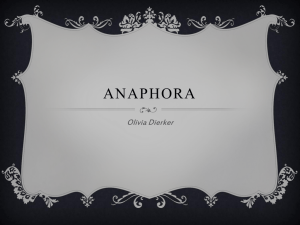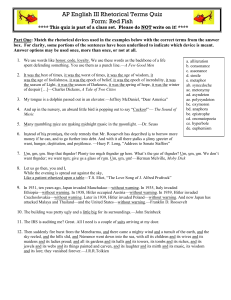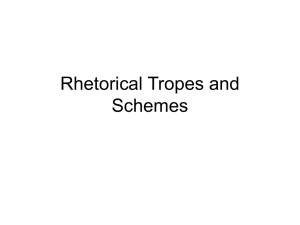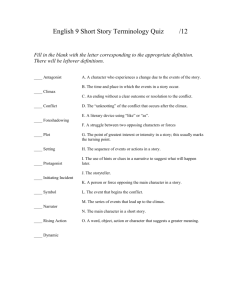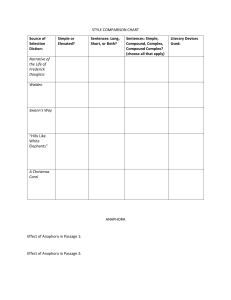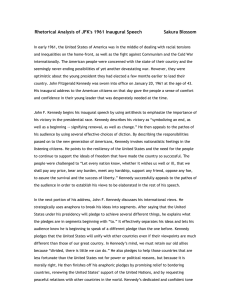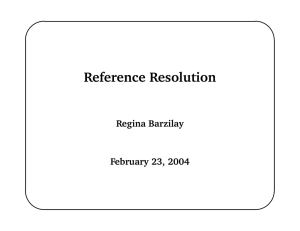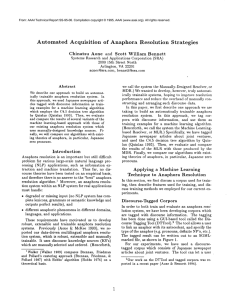Contemporary Literature Fall Final Review
advertisement
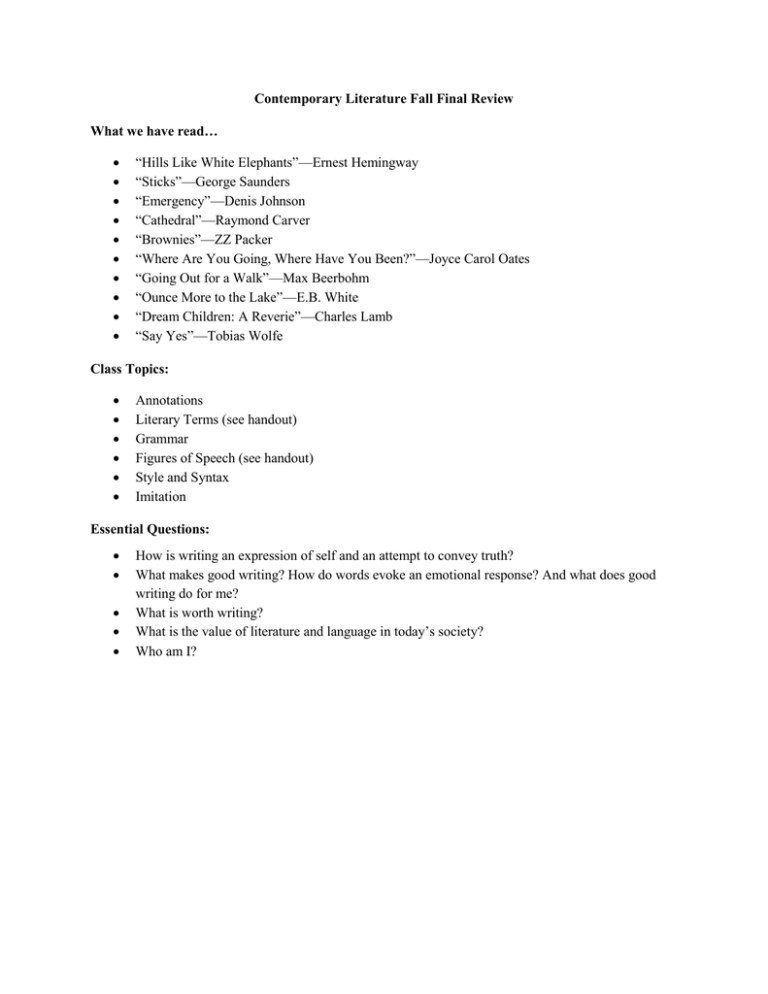
Contemporary Literature Fall Final Review What we have read… “Hills Like White Elephants”—Ernest Hemingway “Sticks”—George Saunders “Emergency”—Denis Johnson “Cathedral”—Raymond Carver “Brownies”—ZZ Packer “Where Are You Going, Where Have You Been?”—Joyce Carol Oates “Going Out for a Walk”—Max Beerbohm “Ounce More to the Lake”—E.B. White “Dream Children: A Reverie”—Charles Lamb “Say Yes”—Tobias Wolfe Class Topics: Annotations Literary Terms (see handout) Grammar Figures of Speech (see handout) Style and Syntax Imitation Essential Questions: How is writing an expression of self and an attempt to convey truth? What makes good writing? How do words evoke an emotional response? And what does good writing do for me? What is worth writing? What is the value of literature and language in today’s society? Who am I? To Practice: 1. 2. 3. 4. 5. 6. 7. 8. Do Hacker comma exercises and review grammar quiz. Memorize the comma rules and know the information on the Basic Grammar Rules handout. Know the editing marks. Study the figures of speech worksheet and identify figures of speech in the 3 personal essays we read. Study the sentence imitations and practice imitating sentences. Memorize the definitions of literary terms and be able to define them using a reading (like on the literary terms quiz) Study notes on the importance of paragraphing, sentence length, sentence variety, and sentence euphony. Prepare for the essay by reviewing our readings from throughout the year. Know what happened in the stories. Practicing Figures of Speech: Match the figure of speech from the word bank with the corresponding example: Parallelism Antithesis Anastrophe Parenthesis Apposition Asyndeton Polysyndeton Alliteration Epistrophe Climax Climax Oxymoron Paradox Anaphora Onomatopoeia Ellipsis 1._______________ But the essence of that ugliness is the thing which will always make it beautiful.— Gertrude Stein, “How Writing is Written” 2._______________ …and that government of the people, by the people, for the people, shall not perish from the earth.—Abraham Lincoln 3._______________ Progress is not proclamation nor palaver. It is not pretense nor play on prejudice. It is not the perturbation of a people passion-wrought nor a promise proposed.—Warren G. Harding nominating William Howard Taft in 1912 4._______________ My days have crackled and gone up in smoke.—Francis Thompson, “The Hound of Heaven” 5._______________ Perhaps this is the most important thing for me to take back from beach-living: simply the memory that each cycle of the tide is valid, each cycle of the wave is valid, each cycle of a relationship is valid.—Anne Lindbergh, Gift from the Sea 6._______________ There is a sort of dead-alive hackneyed people about…—Robert Louis Stevenson, “An Apology for Idlers” 7._______________ And God made the beasts of the earth according to their kinds and the cattle according to their kinds and everything that creeps upon the ground according to its kind. And God saw that it was good.—Genesis, I:24-25 8._______________ Rich, famous, proud, a ruling despot Pope might be—but he was middle class!— V.S. Pritchett 9._______________ Why should white people be running all the stores in our community? Why should white people be running the banks of our community? Why should the economy of our community be in the hands of the white man? Why?—Speech by Malcolm X 10.______________ Renounce my love, my life, myself—and you.—Alexander Pope, “Eloisa to Abelard” 11._______________ John Morgan, the president of the Sons of the Republic, could not be reached by phone.—Student paper 12._______________ Those who have been left out, we will try to bring in. Those left behind, we will help to catch up.—Richard M. Nixon, Inaugural Address, January 10, 1969 13._______________ We must now hope that Mr. Moynahan will devote his next decade to those four or five more novels which will banish his vacillations and uncertainties, purge his unneeded influences, and perfect his native gifts for language, landscape, and portraiture.—L.E. Sissman, The New Yorker 14._______________ All that remained for the moment was to decide where I would go to graduate school, and that question was settled—the “snobs” had been right—by a Kellett Fellowship and then a Fulbright Scholarship to boot.—Norman Podhoretz, Making It (1967) 15._______________ Kant, we may suppose, was more startled by Hume’s apparent destruction of all basis for philosophical certainty; Reid, by the remoter consequences to morality and theology.—Sir Leslie Stephen, History of English Thought in the Eighteenth Century (1876) Answers: 1. Paradox 2. Asyndeton 3. Alliteration 4. Onomatopoeia 5. Epistrophe (though it could be anaphora too) 6. Oxymoron 7. Polysyndeton 8. Anastophe 9. Anaphora 10. Climax 11. Apposition 12. Antithesis 13. Parallelism 14. Parenthesis 15. Ellipsis
